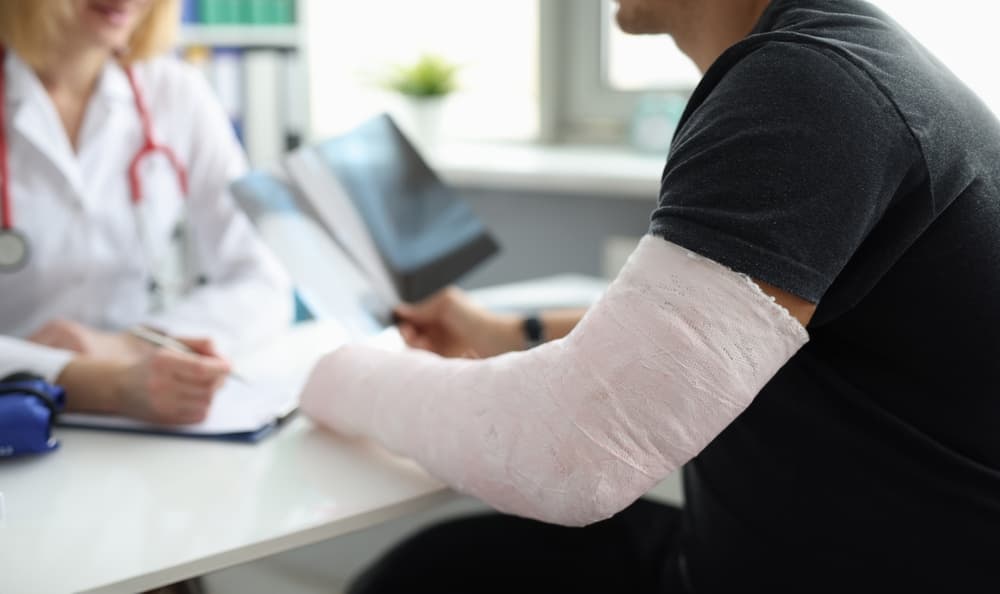What Should I Do Immediately After Getting Injured at Work?
What Should I Do Immediately After Getting Injured at Work?
The accident came out of nowhere, leaving you in pain and unsure of what to do next. One moment, you were at work in Orange County, and the next, a workplace injury disrupted your life. Questions about medical bills, lost earnings, and job security flood your mind.
Acting quickly can make a real difference for your health and future. California workers’ compensation benefits are available to help, but the system has strict rules and deadlines that are easy to miss. Taking the wrong steps can reduce the compensation you deserve. For guidance on protecting your rights and getting the support you need after a workplace injury, contact Bentley & More LLP.
Key Takeaways on Steps to Take Right After a Workplace Injury
- Seek immediate medical attention for workplace injuries, even minor ones, because some conditions worsen without prompt treatment.
- Under California law, you must report your injury to your supervisor or employer within 30 days, though sooner is always better for protecting your claim.
- Document everything related to your injury, including the accident scene, witness information, and all medical treatment you receive
- File a formal workers’ compensation claim with your employer’s insurance carrier to begin the benefits process.
- Keep detailed records of how your injury affects your work capacity, daily activities, and medical treatment needs.
- Avoid giving recorded statements to insurance adjusters without legal guidance, as these can be used against you later.
- Call a workers’ compensation lawyer if you encounter any resistance from your employer or insurance company about covering your workplace injury.
Don’t Delay Medical Care After a Workplace Injury
Your health comes first after a workplace injury, even if the accident initially seems minor. Some injuries that feel small can develop into serious problems without proper care, while others may be worse than they initially appear. Adrenaline and shock can hide pain, causing you to underestimate your condition. What seems like a simple strain or cut can be a deeper injury that needs medical attention.
If your injury requires urgent care, do not hesitate to call 911 or have a coworker take you to the nearest hospital. Orange County has excellent facilities, including UC Irvine Medical Center, Hoag Hospital, and Mission Hospital, that can handle serious injuries. Prompt treatment protects your health and creates crucial documentation of the accident. Even if your employer suggests waiting or using company-preferred providers, you should address serious injuries immediately.
California workers’ compensation allows some choice in selecting a treating doctor, usually within your employer’s medical network. You may have the right to switch physicians if your care is insufficient or treatment is inappropriate.
Reporting Your Injury to Your Employer

California law requires workers to report workplace injuries within 30 days, but letting your employer know immediately or within a few days gives your claim stronger protection. Reporting quickly creates official documentation of when and how the injury happened, starts the workers’ compensation process, and preserves evidence from the accident scene.
When you report your injury, focus on clear facts. Explain your work, how the accident happened, and which parts of your body were affected. Include the time and location of the incident, any equipment or machinery involved, and names of coworkers or witnesses who saw what happened. Sharing these details helps establish that your injury is work-related and strengthens your claim.
Always secure written confirmation that your report reached the appropriate parties through a signed incident report, email, or other documentation. Many Orange County employers have electronic reporting systems that generate confirmation emails or reference numbers. Keep copies of any confirmation to protect yourself if questions arise later about whether you reported your injury on time.
Documenting Your Workplace Injury
Comprehensive documentation of your workplace injury and its aftermath can distinguish between a smooth workers’ compensation claim and a prolonged battle with insurance companies that dispute your injury’s severity or work-relatedness.
Photographing the Accident Scene
If you’re physically able, take photographs of the area where your injury occurred, including any hazardous conditions, defective equipment, or environmental factors that contributed to the accident. These photos prove that cleanup, repairs, or changes can alter the scene before insurance investigators examine it.
Include wide shots showing the overall work area and close-up photos highlighting specific hazards or equipment problems. If other people take photos, ask them to share copies with you for your records.
Identifying Witnesses
Get contact information for coworkers or other people who witnessed your accident or can testify about the conditions that led to your injury. Witness testimony often supports workers’ compensation claims, especially when insurance companies question how accidents occurred.
Ask witnesses to provide written statements about what they saw while their memories remain fresh. These statements can be valuable if witnesses become unavailable or their recollections fade over time.
Preserving Physical Evidence
If defective equipment, unsafe conditions, or hazardous materials contributed to your workplace injury, take steps to preserve this physical evidence before it’s repaired, cleaned up, or disposed of. Notify your employer in writing that equipment or conditions should be preserved for investigation purposes.
Physical evidence can prove the circumstances that caused your injury, especially when insurance companies claim that accidents resulted from employee error rather than workplace hazards.
Filing Your Workers’ Compensation Claim
After reporting your injury to your employer, you must file a formal workers’ compensation claim with your employer’s insurance carrier to begin receiving benefits. This process involves specific forms and deadlines that vary depending on your employer’s insurance arrangements.
Understanding the Claims Process
Your employer should provide information about their workers’ compensation insurance carrier and guide you in initiating the claims process. This typically involves completing claim forms that document your injury, your medical treatment, and how the accident affects your ability to work.
The insurance company will assign a claims adjuster who will review your case, authorize medical treatment, and determine what benefits you’re entitled to receive. Understanding this process helps you navigate the system effectively and avoid common pitfalls that can delay your benefits.
Required Forms and Documentation
California workers’ compensation claims require specific forms that document your injury and begin the benefits process. The most important form is the DWC-1 (Employee’s Claim for Workers’ Compensation Benefits), which must be completed accurately and submitted promptly.
Your employer must provide this form within one working day of learning about your injury, and they must submit it to their insurance carrier within one working day of receiving your completed form. Keep copies of all forms and documentation for your records.
Stay Organized with Your Work Injury Medical Records

Getting proper medical care after a workplace injury is vital. It supports your recovery and creates documentation that strengthens your workers’ compensation claim.
- Follow Treatment Recommendations – Attend every medical appointment and follow your doctor’s advice on medications, therapy, and work restrictions. Missing care can give insurance companies a reason to question your injury or commitment to recovery. If you disagree with your treatment plan, speak up, ask questions, and document those discussions to show you actively participate in your care.
- Work Restrictions and Limitations – If your doctor sets work restrictions, provide your employer with written documentation. These limits protect your health and support eligibility for temporary disability benefits. Restrictions may include lifting limits, reduced repetitive motion, more breaks, or time off from work, all based on your medical needs and documented by a healthcare provider.
- Keep Detailed Medical Records – Organize records of all treatment, tests, medications, and therapy sessions. Request copies from every provider to ensure continuity of care and build a strong record to support your claim.
Avoid Mistakes When Handling Your Work Injury Claim
Workers’ compensation insurers often try to limit payments, even when you are clearly entitled to benefits. After you file a claim, adjusters may contact you to gather details about your accident and injuries.
Answer honestly but stick to the facts, avoiding guesses about fault or complex medical questions without guidance. Insurance companies also control approvals for treatments, tests, and procedures.
If a doctor recommends care the insurer denies, you can challenge the decision under California’s workers’ compensation system. Knowing your options helps you get the necessary treatment and protect your benefits.
Understanding Your Workers’ Compensation Benefits
California’s workers’ compensation system provides several benefits for injured workers, depending on the nature and severity of their injuries and how they affect their ability to work.
Medical Treatment Coverage
Workers’ compensation should cover all medical treatment that’s reasonable and necessary for your workplace injury, including doctor visits, surgery, physical therapy, medications, medical equipment, and transportation to medical appointments.
Medical benefits typically continue as long as treatment is related to your workplace injury and helps promote recovery or prevent deterioration of your condition. There are generally no deductibles or co-payments for approved workers’ compensation medical treatment.
Temporary Disability Benefits
If your workplace injury prevents you from working during recovery, temporary disability benefits replace some of your lost earnings. These payments typically equal two-thirds of your average weekly income, subject to state maximum limits.
Temporary disability benefits continue until you can return to work, reach maximum medical improvement, or are determined to have permanent disabilities that affect your long-term earning capacity.
Permanent Disability Compensation
Workers who suffer lasting impairments from workplace injuries may be entitled to permanent disability benefits based on their reduced earning capacity. These awards compensate for the long-term impact of injuries on workers’ ability to earn income.
Permanent disability medical evaluations determine ratings by assessing how workplace injuries affect workers’ future employability and earning potential.
Protecting Your Job and Rights After Workplace Injury

California law protects workers who have suffered an injury, including rules against employer retaliation and requirements for reasonable accommodations. Employers cannot fire, demote, or punish you for filing a workers’ compensation claim or seeking medical care for your injury.
If you notice retaliation after reporting your injury, keep detailed records and consider speaking with a workers’ comp attorney about your options. Many Orange County employers offer return-to-work programs to help employees ease into their roles with modified duties or accommodations. Participate in these discussions openly, but only return to work when your doctor says it is safe. Prematurely going back can worsen injuries and affect your claim.
FAQs After a Work Injury
How quickly do I need to report a workplace injury in California?
California law requires reporting workplace injuries within 30 days, but immediate reporting provides better protection for your workers’ compensation claim and helps preserve evidence.
Can I choose my own doctor for workers’ comp treatment?
Your choice may be limited to doctors within your employer’s medical provider network, but you typically have some options and can change treating physicians if necessary.
What if my employer says workers’ comp doesn’t cover the injury?
Don’t accept your employer’s opinion about coverage without consulting a workers’ compensation attorney who can evaluate your case under California law.
Will filing a workers’ comp claim affect my job security?
California law prohibits employer retaliation against workers who file legitimate workers’ compensation claims, regardless of the circumstances surrounding their injuries. Employees who experience retaliation can take legal action to protect their jobs and benefits.
What should I do if the insurance company denies my claim?
You can challenge the denial through California’s workers’ compensation appeals process, preferably with a skilled workers’ comp lawyer, to ensure your rights are protected throughout the proceedings. Filing an appeal promptly and presenting detailed medical evidence increases your chances of a successful outcome.
Bentley & More LLP Can Help After Your Work Injury
Workplace injuries can bring unexpected challenges that affect your health, job, and daily life. The Bentley & More LLP team guides you through California’s workers’ compensation process and pursues the full benefits you deserve.
We handle interactions with insurance companies, make sure your medical care is properly covered, and protect your rights while you focus on healing. If your claim faces delays, denials, or confusion over benefits, we are ready to stand by you and offer clear guidance. Call (949) 870-3800 today to discuss your Orange County workplace injury case and see how Bentley & More LLP can guide you in your next steps with confidence.


